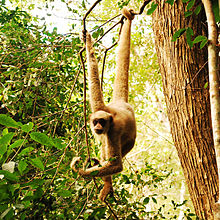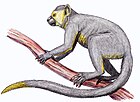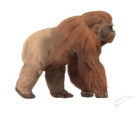| Muriquis | |
|---|---|

| |
| Northern muriqui, Brachyteles hypoxanthus | |
| Scientific classification | |
| Domain: | Eukaryota |
| Kingdom: | Animalia |
| Phylum: | Chordata |
| Class: | Mammalia |
| Order: | Primates |
| Suborder: | Haplorhini |
| Infraorder: | Simiiformes |
| Family: | Atelidae |
| Subfamily: | Atelinae |
| Genus: | Brachyteles Spix, 1823 |
| Type species | |
| Brachyteles macrotarsus Spix, 1823 (= Ateles arachnoides É. Geoffroy, 1806) | |
| Species | |
The muriquis, also known as woolly spider monkeys, are the monkeys of the genus Brachyteles. They are closely related to both the spider monkeys and the woolly monkeys.
Species
The two species are:
| Common name | Scientific name and subspecies | Range | Size and ecology | IUCN status and estimated population |
|---|---|---|---|---|
| Southern muriqui | Brachyteles arachnoides (É. Geoffroy, 1806) |
Brazil (Paraná, São Paulo, Rio de Janeiro, Espírito Santo and Minas Gerais)
|
Size: Habitat: Diet: |
CR
|
| Northern muriqui | Brachyteles hypoxanthus (Kuhl, 1820) |
Brazil (Rio de Janeiro, Espírito Santo, Minas Gerais and Bahia.)
|
Size: Habitat: Diet: |
CR
|
They are the two largest species of New World monkeys, and the northern species is one of the most endangered of all the world's monkeys.
The muriqui lives primarily in coffee estates in southeastern Brazil. Males are the same size and weight as females.
References
- ^ Groves, C. P. (2005). "Order Primates". In Wilson, D. E.; Reeder, D. M (eds.). Mammal Species of the World: A Taxonomic and Geographic Reference (3rd ed.). Johns Hopkins University Press. p. 151. ISBN 978-0-8018-8221-0. OCLC 62265494.
- Chaves, Paulo B.; Magnus, Tielli; Jerusalinsky, Leandro; Talebi, Maurício; Strier, Karen B.; et al. (December 2019). "Phylogeographic evidence for two species of muriqui (genus Brachyteles)". American Journal of Primatology. 81 (12): e23066. doi:10.1002/ajp.23066. hdl:10923/20562. PMID 31736121. S2CID 182008678.
- Chaves, Paulo B.; Alvarenga, Clara S.; Possamai, Carla de B.; Dias, Luiz G.; Boubli, Jean P.; Strier, Karen B.; Mendes, Sérgio L.; Fagundes, Valéria (3 June 2011). "Genetic diversity and population history of a critically endangered primate, the northern muriqui (Brachyteles hypoxanthus)". PLOS ONE. 6 (6): e20722. Bibcode:2011PLoSO...620722C. doi:10.1371/journal.pone.0020722. PMC 3108597. PMID 21694757.
- ^ Richard Wrangham & Dale Peterson (1997). Demonic Male: Apes and the Origins of Human Violence. Bloomsbury.
Further reading
- Russell A. Mittermeier, "Monkey in Peril". National Geographic, March 1987, pages 387–395. Volume 171, No. 3. ISSN 0027-9358. OCLC 643483454
External links
- Conservation of the Muriqui from Brazil
- Southern muriqui media from ARKive
- Northern muriqui media from ARKive
- Primate Info Net Brachyteles Factsheet
- Southern Muriqui Home Page - Pró- Muriqui Association
| Extant species of family Atelidae | |||||||
|---|---|---|---|---|---|---|---|
| |||||||
| Alouattinae | |||||||
| Atelinae |
| ||||||
| Category | |||||||
| Taxon identifiers | |
|---|---|
| Brachyteles | |
This New World monkey-related article is a stub. You can help Misplaced Pages by expanding it. |





